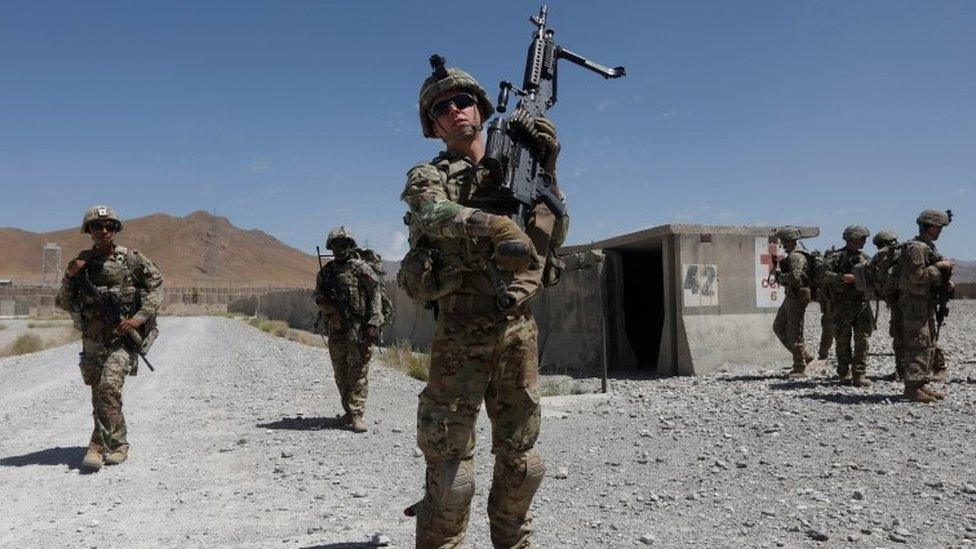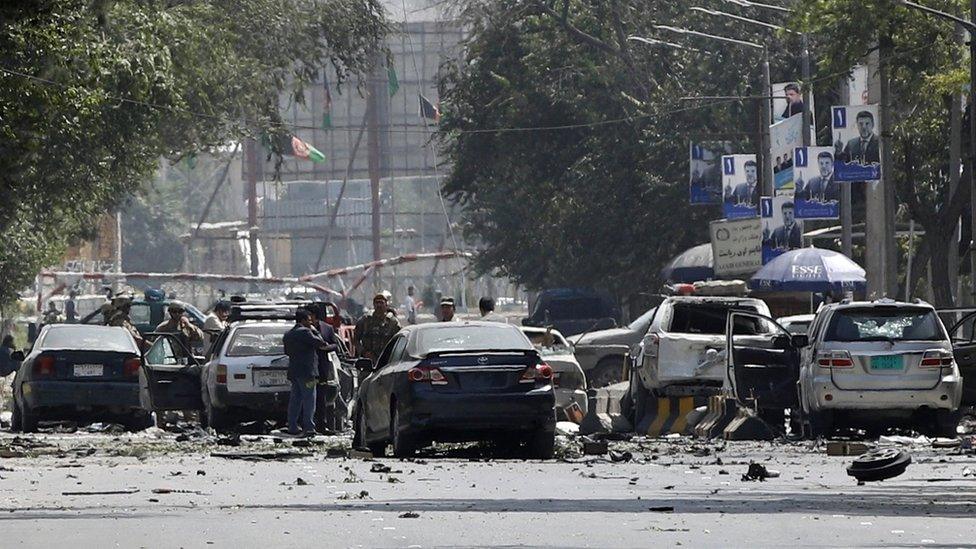Trump cancels secret US meeting with Afghan Taliban
- Published
Is peace with the Taliban possible?
US President Donald Trump says he has called off peace negotiations with the Taliban that sought to end America's 18-year war in Afghanistan.
Mr Trump tweeted he had been set to meet Afghan President Ashraf Ghani, external and senior Taliban leaders on Sunday.
But he cancelled the secret meeting at his Camp David retreat after the militants admitted they were behind a recent attack that killed a US soldier.
The Taliban said Americans will "lose the most" for cancelling.
The talks were due to take place a few days before the anniversary of 9/11.
US-led forces overthrew the Taliban government in Afghanistan in the autumn of 2001, because the militants had given safe haven to the al-Qaeda network to plan the attacks on the US on 11 September.
Meanwhile the office of Afghan President Ashraf Ghani - who would have met separately with Mr Trump at Camp David, according to the US president - said real peace would only be possible when the Taliban agreed to a ceasefire and direct talks with the Afghan government.
Mr Ghani's office praised the "sincere efforts" of its allies.
How surprising is this news?
A face-to-face meeting with the Taliban at Camp David - the site of past historic peace negotiations - would have been an extraordinary diplomatic move by the US president, especially as it would have come just ahead of the 18th anniversary of 9/11.
The top US negotiator had announced a peace deal "in principle" on Monday.
It was the result of nine rounds of talks between the US and Taliban representatives, held in Doha, the capital of the Gulf state of Qatar.
But Mr Trump's tweets on Saturday evening appeared to put an end to nearly a year of painstaking negotiations which had excluded the Afghan government in Kabul, dismissed by the Taliban as American puppets.
"Unfortunately, in order to build false leverage, [the Taliban] admitted to an attack in Kabul that killed one of our great great soldiers," the president tweeted.
"I immediately cancelled the meeting and called off peace negotiations."
Tens of thousands of Afghan soldiers have been killed and injured. This is their story
As part of the proposed deal, the US would have withdrawn 5,400 troops within 20 weeks, in return for Taliban guarantees that Afghanistan would never again be used as a base for terrorism.
The US currently has about 14,000 troops in Afghanistan.
How have the other parties reacted?
In a statement, Taliban spokesperson Zabihullah Mujahid said the talks were going well until Saturday.
Pulling out of the peace process before the signing of the agreement - because of one explosion - shows the US's lack of maturity and experience, he added.
He also said that the Taliban and the Afghan government had agreed to talks on 23 September. The Afghan government has not confirmed this.
In a news conference in Kabul, a spokesperson for President Ghani simply repeated a long-standing wish for direct negotiation with the group.
"We strongly believe in a process that can be led and owned by Afghan government and Afghan people," said Sediq Sediqqi.
Has the US said more?
In an interview with CNN on the morning after the flurry of tweets, Secretary of State Mike Pompeo said the Camp David meeting had been in the works "for a while" before it was cancelled.
He said the Taliban had failed to keep up with preliminary conditions, including reducing violence.
"I think as you saw, if the Taliban don't behave, if they don't deliver ... the president of the United States is not going to reduce the pressure," Mr Pompeo said.
What about the attacks in Afghanistan?
On Thursday, a Kabul car bombing carried out by the Taliban killed 12 people, including a US soldier. A Romanian soldier serving with the Nato-led mission was also killed.
But the Taliban had never agreed to end their violent campaign against Afghan and foreign forces while the peace talks were taking place. Sixteen US troops have been killed this year.
A recent escalation of violence had deepened fears that a looming US-Taliban agreement would not end the daily fighting in Afghanistan and its toll on civilians.
Yet Kabul residents on Sunday questioned why the death of one US soldier should scupper prospects for peace.
"So, the Afghans who have been losing their sweet lives during all these years, is their blood worthless?" asked one grocery shop owner who spoke to the BBC's Pashto language service.


Ever since the US envoy Zalmay Khalilzad arrived in Kabul a week ago with news of "a deal in principle", there have been almost daily Taliban attacks, with a growing chorus of anger in Afghanistan - and the US.
The Taliban say they're targeting foreign forces. But time and again, Afghan civilians are suffering.
The new agreement is said to only include a commitment to reduce violence. A senior US diplomat explained they'd accepted the Taliban argument that a ceasefire was their main bargaining chip for Afghan talks set to follow the US negotiations.
A senior Afghan official angrily told me "a ceasefire is our bargaining chip too", insisting the government would not accept the current deal. Afghan leaders accuse the US of bestowing legitimacy on the Taliban, which has only emboldened them.
There is also mounting scepticism, now voiced by President Trump, that any commitments made by Taliban negotiators in Doha won't be upheld by commanders in the field

What does each side want?
Mr Trump pledged during the 2016 presidential campaign that he would end the US war in Afghanistan.
But he recently said that he wanted to get troop numbers down to 8,600 - about the same as the level when he entered office - and then "make a determination from there". He said the US would maintain a military presence in Afghanistan.
Many in Washington fear that a full US pull-out would leave the country deeply unstable and vulnerable to militant groups that could use it as a base to attack the West.
The Taliban militants now control more territory than at any time since the 2001 US invasion. They have insisted that they will not talk formally to the Afghan government until a timetable for the US troop withdrawal is agreed.
The initial US-Taliban deal was meant to pave the way for intra-Afghan talks on a broader political solution.
Zan TV presenter Ogai Wardak: "If the Taliban come, I will fight them"
Some in Afghanistan fear that any deal could see hard-won rights and freedoms eroded and the Taliban back in power. The militants enforced strict religious laws and treated women brutally during their rule from 1996 to 2001.
Nearly 3,500 members of the international coalition forces have died in Afghanistan since the 2001 invasion, more than 2,300 of them American.
In a February 2019 report, the UN said that more than 32,000 Afghan civilians had died.
The Watson Institute at Brown University says 58,000 Afghan security personnel and 42,000 opposition combatants have been killed.
- Published3 September 2019

- Published5 September 2019
